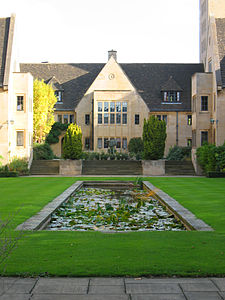Nuffield College, Oxford
This article needs additional citations for verification. (December 2008) |
| Nuffield College | ||||||||||||||
|---|---|---|---|---|---|---|---|---|---|---|---|---|---|---|
| Oxford | ||||||||||||||
 | ||||||||||||||
| Established | 1937 | |||||||||||||
| Named for | Lord Nuffield | |||||||||||||
| Colours | ||||||||||||||
| Sister college | None | |||||||||||||
| Head | Stephen Nickell | |||||||||||||
| Undergraduates | None | |||||||||||||
| Postgraduates | 74 | |||||||||||||
| Website | Homepage | |||||||||||||
Nuffield College is one of the constituent colleges of the University of Oxford in England. It is an all-graduate college and primarily a research establishment, specialising in the social sciences, particularly economics, politics and sociology. It is a research center in the social sciences. Despite being one of the newest and smallest of the colleges, its architecture is designed to conform to the traditional college layout, and its modernistic spire is a landmark for those approaching Oxford from the west.
As of 2006 the college had an estimated financial endowment of £146m[1].
History and purpose today
| Wardens |
|---|
|
Nuffield is a graduate college of the University of Oxford specialising in the Social Sciences, particularly Economics, Politics, and Sociology. It aims to provide a stimulating research-oriented environment for postgraduate students (about 75 in number) and faculty (approximately 60 academic fellows of the College). Nuffield College, which was founded in 1937, is located in the centre of Oxford. It is housed on a site on the western side of the city centre, donated by William Morris, 1st Viscount Nuffield (Lord Nuffield), which was formerly the city's principal canal basin and coal wharfs. Owing to restrictions on construction after World War Two, it was the 1950s before work on the college was completed.
The original plan for the college to occupy the entire plot, on both sides of Worcester Street, was scaled down as a result of budget and material shortages, and to this day the land to the west of the college is occupied by a "temporary" car park. The architectural aesthetic of the final design has attracted some criticism, the spire in particular, since unlike the other "dreaming spires" of Oxford, Nuffield's tower is in fact just a masonry-clad steel-framed book-stack - it houses the college library.
Around a third of Nuffield's fellows hold appointments at the University of Oxford as lecturers, readers or professors. In addition the College fully funds around a dozen Official Fellowships, which the College views as tenured research professorships (although most also teach on the University's graduate programme), and about a dozen three year post-doctoral research fellows. The College also houses a number of young scholars who hold distinguished awards, such as British Academy post-doctoral fellowships, some senior research fellows and a group of research active emeritus & honorary fellows.
The College has been the source of some of the major research developments in social science. These include the British Election Studies and the major programme of research on Social Mobility in Britain. It was the birthplace of the "Oxford School" of Industrial Relations; it pioneered the development of cost benefit analysis for developing countries; and it has made a major contribution to the methodology of econometrics.
From its foundation, Nuffield College pioneered within Oxford and Cambridge a number of trends. It was the first College to have both women and men in the same College. It was the first to be have graduate students only and the first to have a subject focus --- social sciences.
Notable former students
- Kofi Abrefa Busia, former Prime Minister of Ghana
- Anindya Banerjee, Professor of Economics, Birmingham University
- Heather Bell, Director of International Strategy, University of Oxford
- Richard Bruton, Teachta Dála (Member of Irish Parliament), Deputy Leader of Fine Gael
- Mark Carney, Governor of the Bank of Canada
- Donald Chapman, Baron Northfield, Member of Parliament from Birmingham, Northfield
- Barun De, present Chairman, West Bengal Heritage Commission, India
- Harold Edwards, Member of the Australian House of Representatives from the Division of Berowra
- Martin Feldstein, George F. Baker Professor of Economics, Harvard University, USA
- Geoffrey Gallop,former Premier of Western Australia
- Norman Geras, Professor Emeritus of Government, University of Manchester, UK
- Alan Gilbert, Vice Chancellor of the University of Manchester, UK
- Leslie Green (philosopher), Professor of Philosophy of Law, Oxford University
- Jerry A. Hausman, John and Jennie S. MacDonald Professor of Economics at Massachusetts Institute of Technology, USA
- Gamani Corea, former Secretary-General of the UNCTD and Under-Secretary-General of the United Nations
- Patricia Hewitt, Secretary of State for Health, UK
- Kamal Hossain, Former Law Minister of Bangladesh
- Gareth Stedman Jones, Historian of England
- John Kay (economist), First Director of Said Business School, University of Oxford, UK
- Gyanendra Pandey, Professor of History, Emonry University, USA
- Prabhat Patnaik, Present Deputy Chairman, Kerala Planning Commission, India
- Derek Morris, former Chairman, Competition Commission, UK
- Habibur Rahman, former Chief Justice of Bangladesh
- Manmohan Singh, current Prime Minister of India (2004 - Incumbent )
- Robert Skidelsky, Member of the House of Lords, UK
- Richard Smethurst, Provost of Worcester College, Oxford
- Nicholas Stern, Senior Vice President of the World Bank
Teachers/academics
A more complete list is available here
- Robert Allen,
- A.B. Atkinson, Kt, (economist)
- Richard Breen,
- Martin Browning,
- David Butler, (emeritus)
- Sir David R. Cox, (emeritus)
- John Goldthorpe, (emeritus)
- David Forbes Hendry, (economist)
- Paul Klemperer, (economist)
- David Miller (political theorist), (political philosophy)
- Stephen Nickell, (economist)
- Neil Shephard, (econometrics)
- Tom Snijders, (statistics)
Former Fellows
- Martin Feldstein, (now an honorary fellow)
- Sir John Hicks, (Nobel in Economics, died in 1989)
- Sir James Mirrlees, (Nobel in Economics, now an emeritus fellow)
- Ariel Rubinstein, (now an honorary fellow)
- Amartya Sen, (Nobel in Economics, now an honorary fellow)
- Manmohan Singh, (now an honorary fellow)
- Sir John Vickers,

